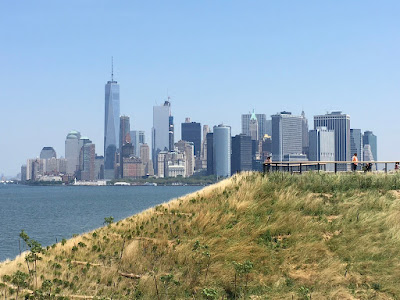Community Composting has become the Community Gardening of the 2020’s. Now, community gardening is thriving throughout the United Staes and in many other countries. New community gardens are being created regularly and cities large and small are providing support for community gardens. So much so that you could say community gardens have become mainstream. In most places, community gardeners do not have to convince elected officials or municipal agencies to support them or not to destroy their garden, a fate community gardeners over the years have faced.
This fact was brought home to me recently when I visited a photographic exhibit, The Community Gardener Portrait Project at the New York City Parks Department Gallery called the Arsenal. The photographs by Zachary Schulman were excellent portraits showing the diversity of NYC Community Gardeners. The fact that Community Gardens and Community Gardeners were being celebrated Is an indication of the support the gardeners receive from the city. There are struggles in some gardens where development pressures exist but the real struggle in New York City is for the community composting programs and sites.
The Mayor and the Sanitation Department cut all funds for Community Composting Projects in a round of budget cuts announced in November of 2023. A yearly budget of $3 million was cut to zero. Over the years the Department of Sanitation (DOS) and the mayors who have and are controlling the agency have flip flopped on supporting composting in general and now community composting. Community Composting funding is just a drop in the bucket of the overall DOS budget yet it provides a service whose benefits far outweigh the cost. It is a way for any resident of New York City to make sure that their food scraps get composted and the product used in city parks, community gardens and private residences. Additional benefits include reducing New York City’s waste steam and providing meaningful jobs.
According to Waste Today magazine, “Community organizations across New York City compost 8.3 million pounds of food waste annually and distribute over 1.7 million pounds of locally made compost to parks, gardens and residents”. While these numbers may seem impressive, the Department of Sanitation collects 24 million pounds of trash, recycling and compost EVERY DAY. The numbers are staggering and point to the need for more focus on the first R of Reduce, Reuse and Recycle to reduce the amount of waste, cost and carbon footprint of New York City.
Since the budget cuts went into effect several donors have stepped up to support community composting and save jobs. An anonymous donor has given an undisclosed sum of money to GrowNYC to continue their program and save 65 jobs until the new fiscal year which starts July 1. A little bit of guestimatiing would place that donation at somewhere around $750,000. A company that makes composting bins for home use, Mill, along with other philanthropists donated an additional $350,000 to support Big Reuse, Earth Matter and the Lower East Side Ecology Center Community Composting efforts and save over 40 jobs. While this support is admirable, private funding of municipal projects sets a bad precedent and should not be expected to replace funding that the city should provide.
The way Community Composting works it that residents save their compostable waste like banana peels and other leftovers, often freezing them until they can be dropped off at a local farmers market, Community Garden or other drop off site. From these drop off sites the compostables are trucked to Governors Island, Queens or the Lower East Side where the scraps are mixed - usually with wood chips and is broken down into a usable product, compost. The final product is delivered to parks, community gardens and given away to private homeowner to fertilize the soil, minimize weeds and lessen the need for watering. In the case of Earth Matter on Governor’s Island the compost is used on plantings on the island.
The material is all handled locally so it does have to be transported long distances and many people are involved in the process. Recently the DOS has begun curbside pickup of compostables which is one of the reasons they want to move away from Community Composting. However, that program can only be enhanced by the outreach and education about composting provided by the organizations involved in Community Composting.
Many of the workers in the Community Composting programs are young people dedicated to do their part to ensure environmental sustainability. This is why I say that Community Composting is the new Community Gardening. Community Gardeners from the 1970’s until today saw that they could make an impact in their communities and community gardening on underutilized land provided that opportunity. Today there are very few remaining spaces to start a community garden in New York City but the organic waste problem exists.
I believe that the city cut the Community Composting budget because of its' grassroots nature. This is exactly what Community Gardeners faced in the early years. Community Gardens have come to be accepted but it took many years to get to that point. Community Composting’s benefits should be clear enough that it doesn’t have to take protests, private funding and petitions to convince the politicians to support Community Composting. Local solutions to environmental problems whether that be starting a community garden to make your neighborhood more livable or small scale local composting projects like Community Composting are good for us all.












